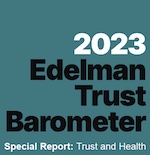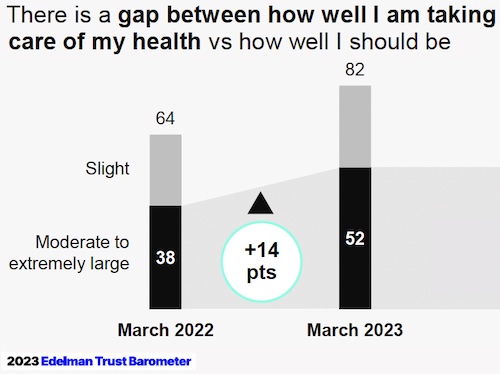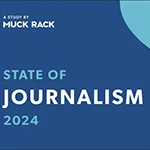 |
Good health is becoming increasingly out of reach for consumers, according to a new report from Edelman, and businesses are seen as having a major opportunity to alleviate the situation.
Fewer than half (46 percent) of the 13,000 respondents across 13 countries that participated in Edelman’s “Special Report: Trust and Health” reported being in very good (or better) health. In addition, 52 percent said that there is a significant gap between “how well I am taking care of my health vs. how well I should be”—a 14 percent jump from last year’s survey.
The report, part of the agency’s 2023 Trust Barometer, found several major factors behind that state of affairs. Inflation (cited by 77 percent) and pandemic restrictions (75 percent) were at the top of the list.
Not surprisingly, inflation’s effect seems to be hitting consumers at the lower end of the economic spectrum with the greatest force. While 57 percent of high-income respondents said they were in very good health, that number drops sharply to 37 percent for low-income respondents.
 |
But several factors that should particularly interest communicators were high on the list as well. Two thirds of respondents (67 percent) said that “lack of trust” negatively impacts their health, with “polarization” (66 percent), “burnout” and “misinformation” (both at 64 percent) just behind.
Another disturbing trend is the continuing decline in the media’s status as a source of healthcare information. Globally, just half (50 percent) say that they trust the media to report accurate information about healthcare information, a slide of seven percent since 2019. That level is even lower in the US (46 percent, down 10 percent) and France (34 percent, down 15 percent).
Perhaps because of that more people are providing themselves with their own healthcare information. (A recent M Booth Health study uncovered a similar trend among Black consumers.) More than four in 10 (41 percent) of respondents to Edelman’s survey say they have been increasingly likely to educate themselves about health issues since the beginning of the pandemic and 39 percent are taking more time to verirfy the truth of the healthcare information they see.
But consumers also think businesses have a responsibility to focus on consumer health. More than eight in 10 (83 percent) said that think healthcare companies should “play a meaningful role in making sure I am as healthy as possible.” Those expectations are also high for brands in sectors including food and beverage (77 percent), technology (74 percent), retail (64 percent) and financial services (60 percent).
That can also have an effect at the cash register. Almost two-thirds of respondents (64 percent) said they consider the impact a brand, its products and its business practices have on consumer health when deciding which brands to buy.
The Edelman study was conducted between March 2 and 13.


 Consumers who once demanded convenience now require consistent, multi-channel experiences that cater to them at every point. Brands must have a clear, audience-appropriate, and channel-specific voice across all platforms.
Consumers who once demanded convenience now require consistent, multi-channel experiences that cater to them at every point. Brands must have a clear, audience-appropriate, and channel-specific voice across all platforms. Employees at U.S. companies are experiencing high levels of burnout, but managers are lagging behind when it comes to their awareness of the problem
Employees at U.S. companies are experiencing high levels of burnout, but managers are lagging behind when it comes to their awareness of the problem Brand has a powerful effect on a company’s valuation, but the level of brand understanding in the investment community leaves a lot to be desired, according to a new study from Brodeur Partners, Interbrand and NewtonX.
Brand has a powerful effect on a company’s valuation, but the level of brand understanding in the investment community leaves a lot to be desired, according to a new study from Brodeur Partners, Interbrand and NewtonX. AI may still be viewed with a wary eye by most media pros, but its use is growing, according to a new study from Muck Rack.
AI may still be viewed with a wary eye by most media pros, but its use is growing, according to a new study from Muck Rack. A new study from Walker Sands says that some marketers have been putting the cart before the horse when it comes to the relationship between marketing channels and business outcomes.
A new study from Walker Sands says that some marketers have been putting the cart before the horse when it comes to the relationship between marketing channels and business outcomes.


 Have a comment? Send it to
Have a comment? Send it to 
No comments have been submitted for this story yet.